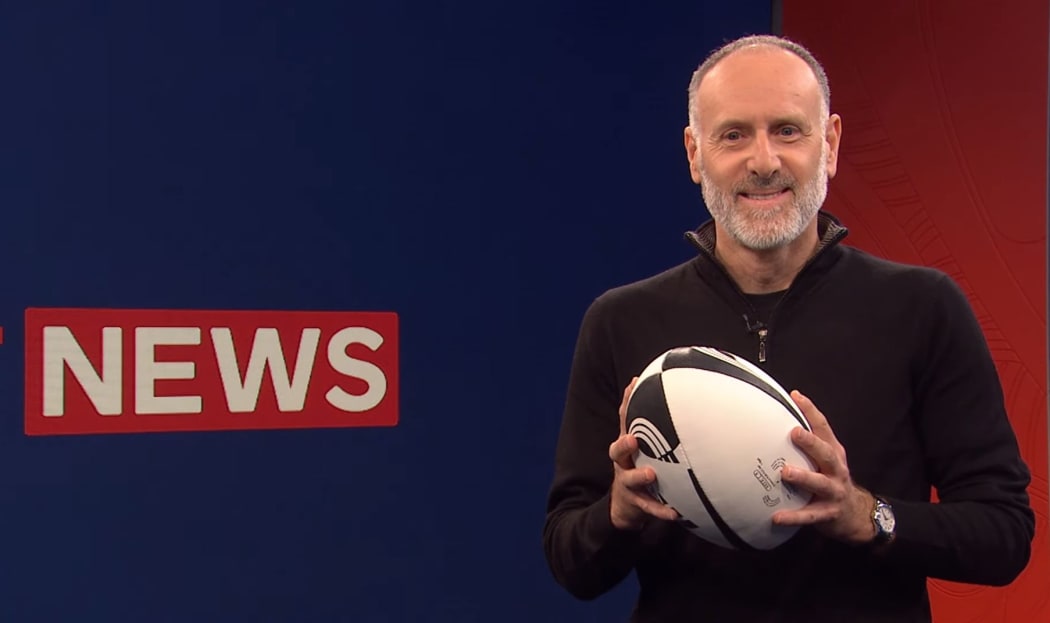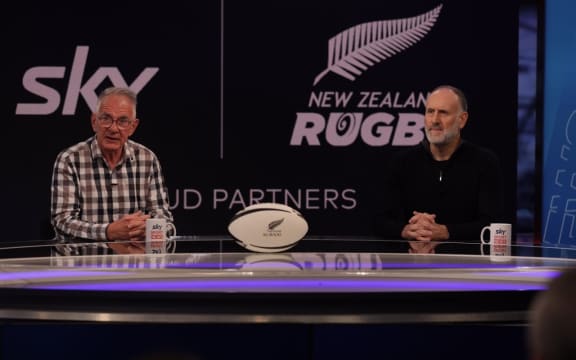Sky and NZ Rugby sprang a surprise this week making a unique deal for TV rights with no bids from any other broadcaster. It's raised questions about conflicts of interest - and compromises in coverage.

Sky TV boss Martin Stewart gives punters the good news on YouTube that he hasn't dropped the ball. Photo: screenshot / YouTube
Last Sunday Stuff reported broadcasting bosses were set to claim compensation for lost revenue after the cancellation of games last weekend including the All Blacks v Italy.
It was a stark example of the problems that arise when broadcasters don't get what they want from the bodies responsible for the sports they put on air
But last Monday one big broadcaster and one sport’s top brass were in perfect harmony here.
At a press conference last Monday in its own studios, Sky TV announced it had retained live exclusive rights to the top grade rugby that have been the cornerstone of its business for more than a quarter of a century.
The cost? An undisclosed sum of hundreds of millions of dollars and a five per cent stake in Sky TV itself.
Media companies overseas have invested in sports franchises and clubs before. they have created joint-ventures to broadcast their content too.
But a sports body taking an equity stake in a media partner seems to be a world first.
Outfits such as Spark - which outbid Sky on cricket rights last week - never got a chance to counter the offer.
NZ Rugby chair Brent Impey told reporters the deal with Sky was done in the final days of the exclusive negotiating period set out in the existing deal with Sky.
He said they didn't need to consider any other bids because they'd done their homework and the chief executive Steve Tew also insisted they couldn’t have got a better deal elsewhere.
"We have long known that there is mutual benefit when each of us succeeds and we're pleased that NZR is becoming an investor in Sky," Sky TV’s boss Martin Stewart said in a statement.
But some pundits pointed out the deal also makes it more likely Sky can retain the rights again before the new deal elapses too.

Photo: RNZ / Cole Eastham-Farrelly
Writing in the New Zealand Herald, tech reporter Chris Keall reckoned the deal has put NZR “in a completely conflicted position”.
“The next time Sanzaar or Rugby World Cup rights come up for grabs, it will diminish its investment in Sky if NZ Rugby punts for Spark - or a new contender like Amazon,” he wrote. .
NZR's Brent Impey told RNZ’s Madison Reidy there was no conflict of interest.
He said NZR wanted other outfits to bid in 2025 and by then the broadcasting market would be totally different.
"I can't see a conflict of interest and at five percent it's not an issue," he insisted
But it could be an issue if cash-strapped Sky surrenders more of itself in future deals than the five per cent stake it's already handed over to NZR.
If the pundits who valued the confidential deal at about $400m are close to the mark, that would be more than the value of the entire company according to on the NZX the Friday before the deal was done.
Checkpoint’s Lisa Owen put Sky’s CEO Martin Stewart on the spot about that later on Monday.
On its website Checkpoint described that as the boss of Sky TV “ruling out giving away any more Sky shares to secure other sports rights”.
But as far as rugby rights were concerned, Martin Stewart merely said he “didn't anticipate” any further deal involving equity in Sky.
Before Monday’s announcement, no-one else had anticipated that five per cent equity deal either.
In the New Zealand Herald, telecommunications and IT lawyer Michael Wigley reckoned the deal - which was approved by Sky shareholders as expected on Thursday - might still need clearance from the Commerce Commission to go any further.
“Sky in its announcement this morning to the market correctly stated that it is the only platform that can provide the footie over all three of satellite TV, free to air (Prime) and online. That's monopoly talk. And New Zealand Rugby has the monopoly rights over live rugby -- and that is hot property,” he wrote..
He said history shows Sky has had "both the ability and incentive to package premium live rugby with high-cost pay-TV packages" and a record of wholesaling the coverage to other providers as “a high-price and low-quality service so that competition to Sky remains weak”.
It remains to be seen if the business watchdog does see any case to answer.
In-house production partner?
Outside the business and financial aspects, concerns about compromises in Sky’s coverage have also been raised by critics.
When TVNZ’s Laura James asked if Sky's coverage of NZR issues would still be impartial now that they are n business together, there was an awkward pause before Sky boss Martin Stewart responded.
“We don't influence the editorial on our shows in any way,” Martin Stewart insisted.
"If we tried to limit contributiions the viewers would sense inauthenticity and the shows wouldn't enjoy the success they now have," he said.
Herald sports editor at large Dylan Cleaver was not convinced.
“Sky has positioned itself as little more than an in-house production company for NZ Rugby,” he said In the Herald.
“Given the most journalism-averse national sporting organisation in the country now has a stake in the company, it's difficult to foresee a much-needed change of direction towards a punchier product,” he wrote.
“Sky has always been horrendous at covering genuine rugby issues. It's brilliant at covering matches, world-leading in many respects, but it's like a beautifully designed living room without any furniture,” he said
With the cricket deals done last week and the rugby one this week, the thick end of a billion bucks has been poured into two top sports in this country.
“It’s just a shame that right now the only losers in all this are the one sector that's meant to benefit most from competition: the consumer,” said Dylan Cleaver in the Herald.

